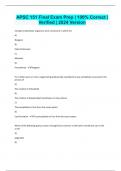Apsc 151 fina - Study guides, Class notes & Summaries
Looking for the best study guides, study notes and summaries about Apsc 151 fina? On this page you'll find 98 study documents about Apsc 151 fina.
Page 4 out of 98 results
Sort by
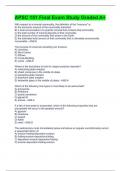
-
APSC 151 Final Exam Study Graded A+
- Exam (elaborations) • 16 pages • 2024
- Available in package deal
-
- $12.49
- + learn more
APSC 151 Final Exam Study Graded A+
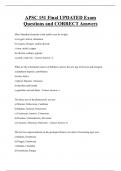
-
APSC 151 Final UPDATED Exam Questions and CORRECT Answers
- Exam (elaborations) • 51 pages • 2024
-
- $9.99
- + learn more
APSC 151 Final UPDATED Exam Questions and CORRECT Answers Most Abundant elements in the earth's crust by weight a) oxygen, silicon, aluminum b) oxygen, nitrogen, carbon dioxide c) iron, nickel, copper d) calcium, sodium, gypsum e) earth, wind, fire - Correct Answer- A What are the 2 dominant sources of lithium to power the new age of devices and transport a) porphyry deposits, astroblemes b)veins, dykes c) placer deposits, volcanoes d) rhyolites and basalts e) granitites and s...
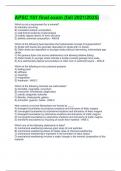
-
APSC 151 final exam (fall 2021-2025)
- Exam (elaborations) • 18 pages • 2024
- Available in package deal
-
- $12.49
- + learn more
APSC 151 final exam (fall )
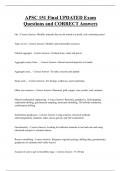
-
APSC 151 Final UPDATED Exam Questions and CORRECT Answers
- Exam (elaborations) • 23 pages • 2024
-
- $9.49
- + learn more
APSC 151 Final UPDATED Exam Questions and CORRECT Answers Ore - Correct Answer- Metallic minerals that can be mined at a profit, rock containing metal Types of ore - Correct Answer- Metallic and nonmetallic resources Natural aggregate - Correct Answer- Crushed stone, sand, and gravel Aggregate comes from... - Correct Answer- Glacial outwash deposits in Canada Aggregate used... - Correct Answer- To make concrete and asphalt
APSC 151 Final Exam Prep | 100% Correct | Verified | 2024 Version
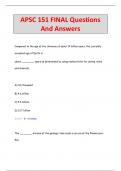
-
APSC 151 FINAL Questions And Answers
- Exam (elaborations) • 206 pages • 2024
- Available in package deal
-
- $12.49
- + learn more
When determining the risk of mass wasting in an area, which of the following will provide the most valuable information? ~ Analysis of air photographs Mineral life cycle: ~ Exploration, mining and milling, smelting and refining, manufacturing Average amount of mineral consumed in life time ~ 3.19 million pounds of minerals, metals, fuels Open-pit mining production cycle ~ 1. load, haul, drill and blast 2. crush and grind 3. concentrate 4. extract Mine project life cycle ~ Explorati...
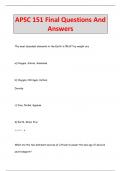
-
APSC 151 Final Questions And Answers
- Exam (elaborations) • 83 pages • 2024
- Available in package deal
-
- $14.19
- + learn more
A mass of broken rock high on a mountain slope has a rectangular area measuring 400m and 600m, and is 50m thick. Mass fails and slides down the mountain. The final density of the failed mass does not change but is now distributed uniformly over an elliptical area of 800m download and 500m across the slope. What is the average depth of the runout mass of broken rock. a) 38m b) 9.5m c) 72m d) 30m e) 50m ~ a mass rectangle = mass ellipse 400 x 600 x 50 = π x (800/2)(500/2)T T = 38...
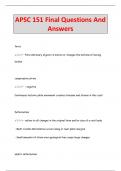
-
APSC 151 Final Questions And Answers
- Exam (elaborations) • 160 pages • 2024
- Available in package deal
-
- $13.99
- + learn more
cleavage directions ~ 1 (ex. Muscovite) 2 @ 90 degrees (ex. orthoclase) 2 not @ 90 degrees (ex. amphibole) 3 @ 90 degrees (ex. halite) 3 not @ 90 degrees (ex. calcite) 4 (ex. fluorite) fracture ~ - Absence of cleavage when a mineral is broken *Conchoidal fracture* - breaks to form smooth curved surfaces like broken glass specific gravity ~ - Ration of the weight of a mineral to the weight of an equal volume of water - Average value is approximately between 2.5 and 3 magnetism ~...
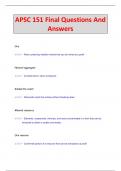
-
APSC 151 Final Questions And Answers
- Exam (elaborations) • 30 pages • 2024
- Available in package deal
-
- $10.49
- + learn more
Asteroid ~ Any of numerous small celestial bodies composed of rock and metal that move around the sun (mainly between the orbits of Mars and Jupiter) Jupiter ~ Planet -Gas giant -Strong magnetic field -Counter rotating layers in atmosphere -Mantle composed of metallic hydrogen -69 moons lol Saturn ~ Planet -Gas giant -Thin rings 250000+km in diameter -Pole spot/hexagonal cloud -62 moons Uranus ~ Planet -Gas giant -Rotates on a tilted axis Neptune ~ Planet -Gas giant -Prob...
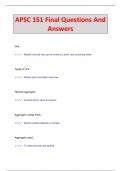
-
APSC 151 Final Questions And Answers
- Exam (elaborations) • 51 pages • 2024
- Available in package deal
-
- $12.99
- + learn more
Tsar bomb ~ Largest fusion bomb (3500x Hiroshima) Solar flare ~ Eruption of charged particles caused by Sun's magnetic field due to rotation of material and energy inside Sun Solar cycles ~ Every however many years there are solar highs were there is more stuff happening, e.g. you can see Northern Lights in Kingston Earth's magnetic field ~ Pulls Sun's particles up and pulls them into poles (Northern and Southern Lights), very slowly breaking down Mercury ~ Only planet with mag...

Do you wonder why so many students wear nice clothes, have money to spare and enjoy tons of free time? Well, they sell on Stuvia! Imagine your study notes being downloaded a dozen times for $15 each. Every. Single. Day. Discover all about earning on Stuvia

